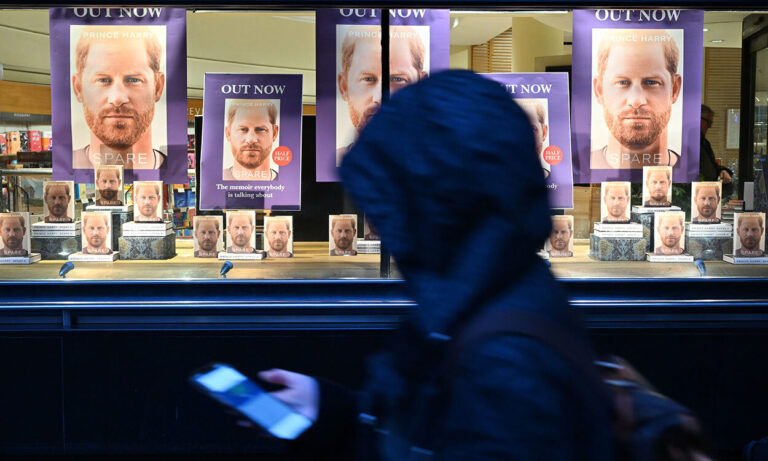Everything wrong with the clickbait headlines covering Prince Harry’s memoir Spare
On his odyssey from Oprah to book publisher Random House, there is no question that Prince Harry has royally stirred up the world. With revelations branching from losing his virginity to the tragic loss of his mother, his recollections have certainly shed light upon how the Duke of Sussex has coped—and not coped—with the traumas of his younger years. Nevertheless, anyone who remembers the death of Princess Diana will invariably be aware of the press’ involvement. Similarly, anyone who knows of Prince Harry will also be conscious of his wilder years as a youngster. So why did these emotive elaborations warrant such widespread press attention? In short, they didn’t.
The hysteria and intrigue surrounding Prince Harry and his childhood is inexhaustible and, more often than not, gratuitous. Throughout his royal rampage, the Duke has made it clear his case is primarily with the British press. Well Harry you have, albeit inadvertently, hit the nail on the head.
When those explosive pages of Prince Harry’s memoir Spare were leaked only a couple of days ago, the world’s media scene was enveloped in a dark PR smog making it almost impossible to establish even clues towards the whole truth. As soon as the pages became public property, Harry’s forthright confessions about his life in the military were instantly blasted across the UK’s front pages. From tabloids to broadsheets, on 5 January 2023, you would be hard-pushed to miss a headline exclaiming that Prince Harry had killed 25 Taliban fighters while stationed in Afghanistan. Security and protocol concerns aside, the fact that he had admitted to treating his victims as “chess pieces” was enough to trigger an international media frenzy.
One week later, 20 people were killed in Afghanistan after a suspected suicide bomber detonated outside the foreign ministry in Kabul. This was documented, to be sure, but the tragedy’s press coverage and interest was a drop in the ocean compared to Harry’s bygone musings. This exposed the crux of the issue with our media in Britain—without undermining the significance of his revelation, Prince Harry’s personal confession of an occupational inevitability should not eclipse 20 deaths and the very real social struggles happening today.
It’s not just the coverage of Spare that has demonstrated this fundamental flaw in the British press. From live feeds to breaking news, the notorious Netflix documentary Harry & Meghan was a force to be reckoned in the newsroom. For two weeks, the public were subjected to a torrent of Sussex sensationalism.
In the second round of episodes, we learned of Meghan Markle’s miscarriage—a horrendous experience that tragically affects one in eight people who know they are pregnant. This could have been an exceptional opportunity to give a voice to the countless women who have experienced similar grief. Yet, true to form, Prince Harry related it to the exceptional, and unrelatable, aspect of their life by blaming the press… And the next day it was on our front pages.
Meanwhile, in Idaho, US, a woman was posting about her miscarriage on TikTok. The 35-year-old actively miscarried for what turned out to be a full 19 days. She said she hoped sharing her ordeal with people could inspire changes in the restrictive abortion laws. Again, this does not undercut the definite tragedy of Harry and Meghan’s loss. But we should be asking ourselves what right they have to a media explosion while the women of Idaho have to use TikTok to communicate the potentially fatal danger they have been in since the Supreme Court overturned Roe v. Wade.
Of course, it would be naive to pretend any news involving the royal family isn’t going to cause a stir. They are, without a doubt, some of the most famous (and infamous) figures on the global stage. Their ‘never complain, never explain’ philosophy only works in the first place because they’re very much aware of this. So it is unsurprising that when something as scandalous as the release of a tell-all memoir from a rogue royal occurs, there is colossal interest. But that is yesterday’s news.
Harry and Meghan officially exited the royal family in 2020 and we have been kept regularly informed of the ongoing malcontent. Should the book have been the first hint of Harry’s criticism and general unhappiness, then the extensive reporting may have been justified. Or, perhaps if Harry was wilfully offering hard evidence of institutional racism or PR abuse, there would be a just cause for the country’s outcry. But, as a fundamental part of a nation’s constitution, familial quarrels are unlikely to hold any weight in our decision to back them. So how can we possibly rationalise the way we have chosen to cover them?
This case of the chicken and the egg is a cycle that has to be broken before it breaks our news. To retain relevance and respectability, both qualities must be woven into the fabric of each and every headline we read. On the flip side, we must start actively thinking about the type of news we are consuming and, crucially, whether it has earned its airtime. For now, general preconceptions of gossip and sensationalism are largely confined to the tabloids. But if our media’s response to Prince Harry’s recent exposé is anything to go by, we are in very real danger of slipping irrevocably from truth-tellers to click-baiters.





